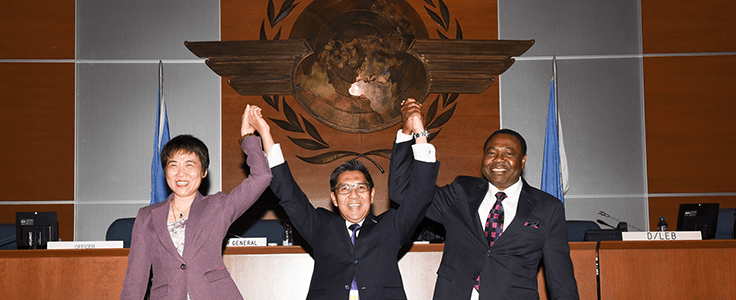Air transport is the world’s first major industry sector to adopt a global approach to international emissions reduction
Montréal, October 6, 2016: ICAO’s Member States concluded the UN aviation agency’s landmark 39th Assembly today, delivering an historic agreement on a new global market-based measure (GMBM) to offset CO2 emissions from international flights and a comprehensive roadmap for the sustainable future of international aviation.
“Aviation can now claim its ‘Paris moment’,” declared ICAO Council President Dr. Olumuyiwa Benard Aliu, “Air transport is not only the world’s first major industry sector to adopt a global approach to international emissions reduction, but very importantly States representing more than 83% of international flight operations have volunteered to participate in the GMBM from its earliest stages in 2021.”
“The GMBM will serve as an important new tool to complement the wide-ranging emissions reduction progress already being achieved under aviation’s basket of measures,” noted ICAO Secretary General Dr. Fang Liu in her Assembly closing remarks, “namely through technological innovation, modernized procedures, and the ever-expanding use of sustainable alternative fuels.”
Significant and far-reaching 39th Assembly progress was achieved across all of ICAO’s five Strategic Objectives for Aviation Safety, Air Navigation Capacity and Efficiency, Aviation Security and Facilitation, the Economic Development of Air Transport, and Environmental Protection.
Targets and approaches
ICAO Member States delivered very clear endorsements for the targets and approaches being pursued globally under ICAO’s comprehensive strategic plans, and supported the need for it to provide similar leadership at the global level in the form of two new Global Plans now to be developed for Aviation Security and Air Transport Economic Development.
They also showed their clear appreciation and support for ICAO’s recent reprioritization on assistance and capacity-building under its No Country Left Behind strategy, aided by more intensive global partnerships and resource mobilization.
Other decisions of note included agreement to amend the Chicago Convention to increase the number of States on ICAO’s Governing Council and its supporting Air Navigation Commission.
“The Council President and I have been very encouraged to see such a high level of interest from Member States and industry in the work of ICAO, recognizing and supporting our leading role in global aviation,” Dr. Liu concluded. “This Assembly has benefitted from the participation of more than 2,200 delegates from 185 Members States, non-Member States and 56 observer delegations – the highest number we have ever hosted – and we have achieved 30% more work than at any previous event of this kind.”
A more detailed review of the specific environmental items endorsed at the 39th Assembly may be found below.
ICAO’s Plan for Environmental Protection
- Endorsement of a global market-based measure (GMBM), the first-ever market-based measure adopted by an entire industry sector.
- Recognition of the ongoing work to develop a new supersonic noise Standard for future aircraft, and that the possible certification of a supersonic aeroplane in the 2020-2025 timeframe.
- Recognition of the development of a new non-volatile Particulate Matter (nvPM) emissions Standard for all turbofan and turbojet aircraft with rated thrust greater than 26.7kN (first-ever).
- Support for the ICAO aspirational goals on CO2 emissions reduction and recognition of progress on all elements of the Basket of Measures.
- Recognition of the development of a new global CO2 emissions certification Standard for New Type and In-production aeroplanes (first-ever).
- Welcome the partnership agreement between ICAO and ACI that focuses on various cooperative initiatives for greener airports.
- Recognition of significant achievements in assisting States to develop their State action plans for CO2 emissions reduction, leading to the submission of 101 State plans to ICAO
- Request for advancing on emerging issues such as:
o environmental aspects of aircraft end-of-life (e.g. aircraft recycling); and
o climate change risk assessment on international aviation, including identification of adaptation measures

More than 2,200 delegates from 185 Members States, non-Member States and 56 observer delegations to ICAO’s 39th Assembly achieved 30% more work than at any previous event of its kind, including an historic agreement on a new global market-based measure (GMBM) for international flight emissions.Photo: ICAO
ICAO Assemblies are conducted once every three years, with the agency’s 40th set to take place during its 75th Anniversary year in 2019
Source: ICAO
